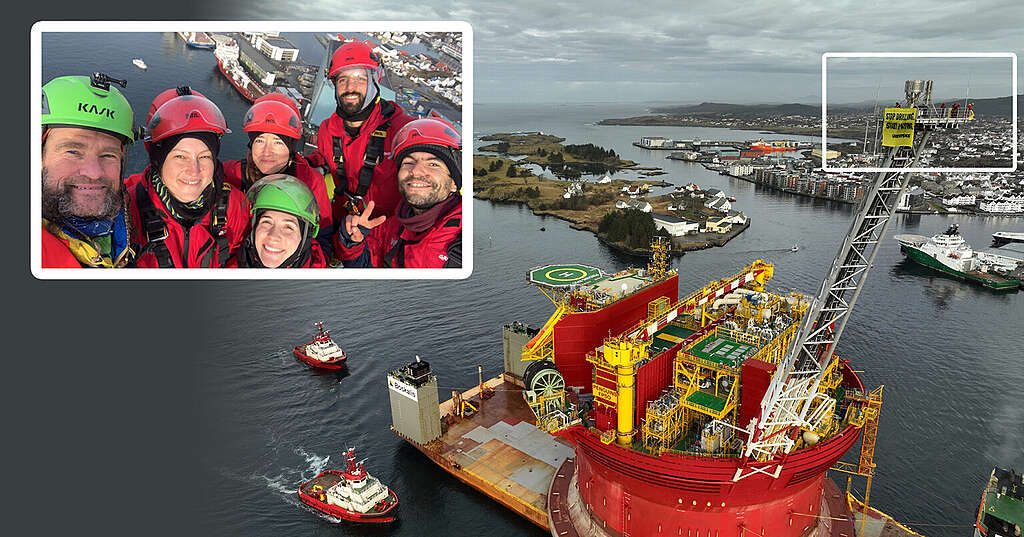Just over a year ago, Shell sued Greenpeace UK, Greenpeace International and nine individuals for millions over a completely peaceful protest. We showed them their bully tactics won’t intimidate us – and now they’ve backed down and settled out of court.
And we’ve made sure not a penny of our supporters’ money will go to Shell. Here’s what you need to know.
Why did Shell sue Greenpeace?
Last year, six Greenpeace activists boarded a Shell-contracted ship in the Atlantic carrying a key piece of equipment to drill for new oil in the North Sea.
When the protest ended, the only damage Shell could find was a padlock which, they alleged, our activists broke. That’s it. Yet they came after us with a million-dollar lawsuit, which they justified for their spending on safety.

They demanded $1m in damages – and planned to spend another $10m in legal fees, which we could have had to pay if we lost the case.
For a company that made £22.4 billion in profits last year alone, this is peanuts. For Greenpeace UK, this would have been one of the biggest threats we’ve faced in our 50-year history.
But for Shell, this was never about the money. The real reasons behind their suit were revealed when, during early negotiations, the company offered to withdraw the case if we promised never to take action against their rigs, at port and at sea – forever. The mask slipped. This was a textbook SLAPP suit – a bullying legal tactic designed to intimidate critics.
SLAPP stands for strategic lawsuit against public participation. Shell’s lawsuit has been widely acknowledged to be a SLAPP suit. The UK Anti-SLAPP coalition, a group of leading media organisations, lawyers and rights groups has issued a statement in support of Greenpeace.
How Greenpeace fought back – and created a PR disaster for Shell
Thanks to our incredible supporters, Shell backed down from their unreasonable demands. A sustained, year-long campaign against the suit, supported by celebrities including Joe Lycett, Stephen Fry and Emma Thompson, turned the legal move into a PR embarrassment for Shell. The case was dubbed the ‘Cousin Greg’ lawsuit by Forbes after a scene in the Emmy-awarded drama Succession, in which the hapless character threatens to sue Greenpeace to universal dismay.
How was the case settled?
As part of the settlement, not a penny of our supporters’ money will go to Shell. Instead, we have agreed to donate £300,000 to our brave friends at the RNLI whose mission to save lives at sea has become even more important as climate change supercharges storms and floods around the world.
We have also agreed not to protest at three of Shell’s oil and gas fields for the next five years and at a fourth one for the next ten years, all of them in the North Sea. These are largely declining fields where Shell has been drilling for years and where we had no plans to intervene by direct action.
Even so, we don’t like having to make this kind of concession to a fossil fuel company, but the alternative could have been much worse.
This is the absurd nature of SLAPP suits: even if Greenpeace had gone on to win the case, we could still have ended up worse off than by settling the case at this early stage.
This settlement has no impact on our future campaign plans and allows us to continue to vociferously campaign against Big Oil, to demand that it stops drilling and starts paying for all the harm their business has caused.
What happens next?
Thanks to the thousands of generous, passionate supporters who have donated to our Shell legal fund, we now have even more resources to ramp up our fight against the fossil fuel industry.
And while this legal battle might be over, Big Oil’s dirty tricks aren’t going away. Greenpeace faces further legal battles around the world, including a lawsuit in North Dakota for over $300 million which threatens the very existence of Greenpeace in the US.
But we’ve never been ones to run from a fight – and we don’t intend to start now. With our supporters behind us, we will ramp up our campaigning until the fossil fuel industry stops drilling and starts paying for the damage it is causing to people and planet.
